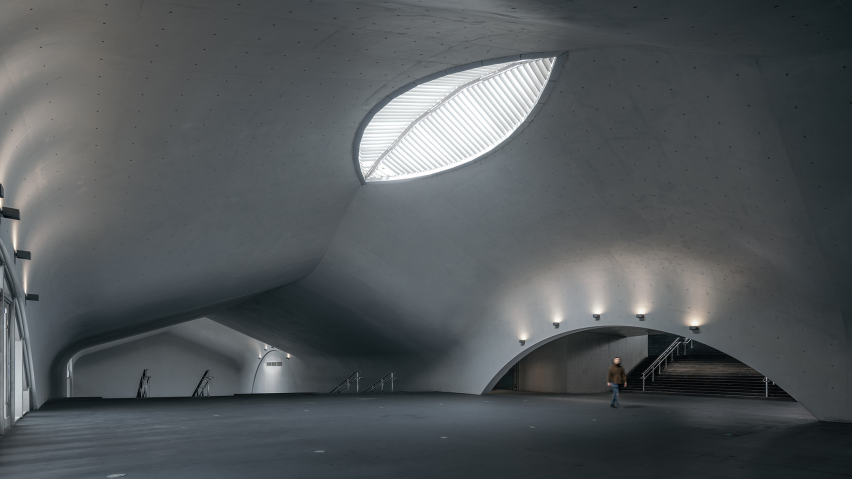Shanghai-based studio Wutopia Lab has created Deep Time Palace, an underground museum in Changchun featuring a wavy concrete roof with eye-shaped openings.
Located on the southeast corner of the Palace Museum of the Manchurian Regime site, the new museum is the largest fair-faced concrete building in northeastern China, according to the studio.
Named Deep Time Palace, the 16,650-square-meter museum comprises two underground levels with passages that connect to the Manchurian Regime Palace to the west and the Museum of the History of Northeast China Under Japanese Occupation to the north.
"I believe the art museum should adopt a more modest approach," said Ting Yu, chief architect of Wutopia Lab. "With this in mind, I have concealed the art museum, avoiding any alteration to the established ambiance above."
The choice to use fair-faced concrete and a large-span structure, commonly found in industrial buildings, pays homage to the city's industrial past and creates a vast open exhibition space.
"When envisioning the space, I aimed to utilize the underground structure as a starting point to convey the sense of 'depth'," Yu said.
"I also wanted to challenge our conventional mindset of a linear timeline by introducing an immense scale that would disorient viewers."
The studio used steel to form the structure of the thin-shell concrete roof covering the museum, which spans over 10,000 square meters.
This is covered in green plants and can be used for social activities as well as parking.
Two eye-shaped skylights were added to the roof, allowing natural light into the underground space.
"While underground structures typically serve as refuges, the interplay of natural light uncovers the profound 'depth' concealed behind the grandeur of the museum, imbuing it with a sense of spirituality and sanctity," said Yu.
A single-layer steel mesh shell with curved glass frames the main entrance of the museum at the north side of the building, where visitors are taken to the main hall of the underground museum via a series of steps.
The top of two entry gates, positioned on both sides of the glazed facade, slightly lift up into wavy forms that resemble a wingspan.
The sweeping roof extends to the plaza south of the site, where its cross-section forms the back entrance of the museum.
Wutopia Lab also unveiled its newly established Wuto-Art at the opening of the museum, showcasing an art installation made of perforated aluminum panels, which the studio is known for using in its projects.
Wutopia Lab was founded by Yu along with Erni Min in 2013. The firm recently completed a number of museums across China, including one in Shanghai with arched copper shell, and another one influenced by Chinese ink drawing in Qinhuangdao.
The photography is by CreatAR Images.
Project credits:
Chief architect: Yu Ting
Project architect: Huang He
Project manager: Pu Shengrui
Design team: Pu Shengrui, Pan Dali, Sun Liran (Conceptual Design Phase), Xie Jialin (Drawing Compilation Phase)
Construction firm: China Construction Eighth Engineering Division Co.,Ltd.(North China)
Design consultants: Wei Minfei, Miao Binhai, Zhang Zhun, Qian Yanmin, Lin Xingchun, Zhang Kejie
Lighting consultants: Gradient Lighting Design, Chloe Zhang, Zang Yanting, Deng Xiaodan

